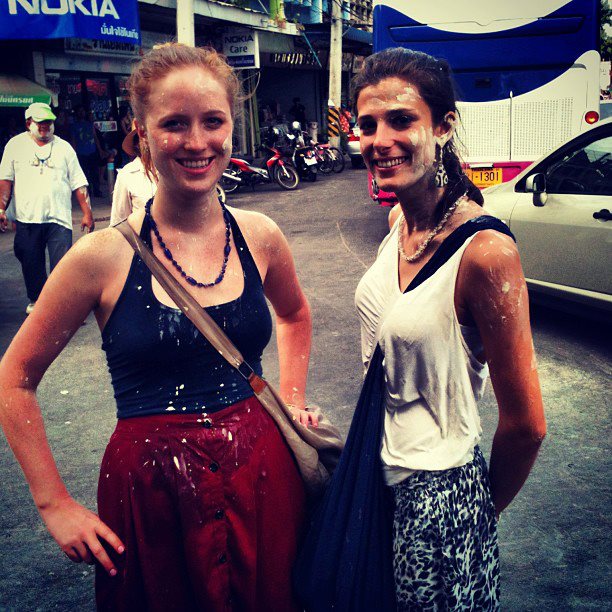Our journey begins as it does every time I take visitors to see the infamous market that straddles a railway track in Mae Klong, a city some eighty kilometers southwest of Bangkok. We cross Bangkok on the Skytrain before switching to motorbike taxis, my two European friends recoiling in horror as I shepherd them onto a bike each before they have time to properly question not wearing a helmet.
“You’ll be fine”, I assure them as their podgy, orange-vested drivers pull away into the traffic and drizzle that makes the gray sky seem even murkier. It is still two days until the start of the Songkran New Year festivities that are meant to mark the arrival of the wet season, but the rains are already well on their way.
Having survived the short journey, the platform of Wongwian Yai railway station lays before us: a most local version of hustle and bustle that only a community built up around the train tracks can manage. Food vendors sell everything from Hainanese chicken rice, to noodle soup and coconut ice cream to freshly de-shelled jackfruit, much to the delight of my friends, who have developed quite the taste for it in the course of their jaunt around Southeast Asia. They have a particular knack for going overboard on the things they like, so not only do they buy half a kilo of jackfruit from their adopted street seller on the way to and from their Bangkok guest house each day, promptly devouring the lot, but they also insist on ordering two plates of papaya salad and two plates of stir-fried morning glory each evening when they eat at the same roadside restaurant along the Chaophraya River.
It is still two days until the start of the Songkran New Year festivities that are meant to mark the arrival of the wet season, but the rains are already well on their way.
Just a handful of trains depart from this platform each day on a single route, such is the bizarrity of this lone stretch of track completely disconnected from the rest of the Thai network. It is used almost exclusively by workers and school children on their daily commute, and the ancient Chinese carriages – a conductor on one of my previous rides misjudged my enthusiasm for the intricate details of rolling stock, and insisted on giving me a mini history lesson – would take us from what are barely the outskirts of downtown Bangkok all the way to the industrial port of Mahachai.


Before we know it, we are surrounded. Smiling well-wishers dip their hands into small plastic buckets of moist off-white clay powder and smear it on our cheeks, foreheads, and necks. It drips down in sticky globs onto our clothes, which are now also soaked through from the spray of the pistols being squirted both right in front of our faces and from the elevated position of the floats just behind.
For a few seconds, we get the undivided attention of what at least feels like the whole crowd, vying among themselves to get to the front of the scrum and drench us.
For a few seconds, we get the undivided attention of what at least feels like the whole crowd, vying among themselves to get to the front of the scrum and drench us. But then, as quick as that, they are gone, further down the street to their next unsuspecting victims. We are left standing and squelching in the remaining puddles. I can still hear the blaring stereo, the shrill cries of the revelers, as they turn into the next street and disappear from view.
We turn and walk a couple of blocks to at least give ourselves the veneer of composed dryness. Pretty soon we are on a minivan, our wet behinds sliding a little on the leather seats as the driver weaves through motorway traffic on the way back to the comparatively dull normality of Bangkok, where the festival has yet to hit.
The large city celebrations there in the next few days will see thousands of people barely able to breathe as they squeeze through the crowds down heaving roads of revelers. Songkran parties will turn a Buddhist festival into commercially centered, alcohol-fuelled nightlong raves. But none of that will compare to our own completely unexpected, spontaneous small-town celebration, its richness in its innocence, light-heartedness, and its transcendence across generations.
For my two friends it is their first taste of Songkran and, little do they know, the best they will ever get.
Have you ever stumbled upon a local festival that you weren’t expecting? Tell us about it in the comments below.